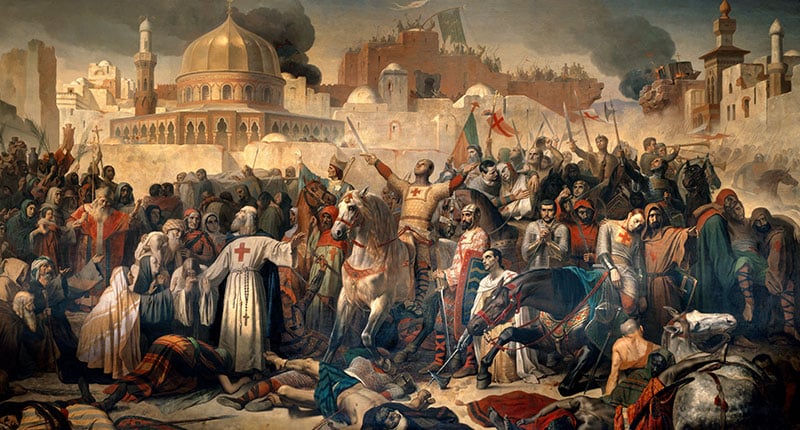
The Crusades, a series of military campaigns launched by Christians from Europe between the 11th and 13th centuries, were a significant clash of empires and religious conflict. These campaigns were primarily motivated by a desire to reclaim Jerusalem and other holy sites in the Middle East from Muslim control. In this article, we will explore the origins, motivations, key events, and lasting impacts of the Crusades.
The Crusades emerged from a complex web of historical, religious, and political factors. The roots of this conflict can be traced back to the Byzantine Empire’s request for military assistance against the Seljuk Turks. Pope Urban II, in response, called for a holy war, giving rise to the First Crusade.
Origins of the Crusades
The origins of the Crusades can be found in the expanding Islamic empires and the subsequent threat they posed to Christian territories, including the Byzantine Empire. The Seljuk Turks’ advance in Anatolia and their control over Jerusalem ignited concerns among Christians.
Religious Motivations
Religion played a significant role in motivating Crusaders. The concept of holy war, or “jihad,” was familiar to both Christians and Muslims. The Crusaders believed they were fighting to defend their faith, secure salvation, and protect the holy sites of Christianity from Muslim rule.
Political Motivations
While religious fervor was a dominant force behind the Crusades, political motivations cannot be ignored. European nobles saw an opportunity to expand their territories and gain wealth and prestige through conquest. Additionally, the papacy sought to strengthen its influence and unite warring factions under a common cause.
First Crusade: A Call to Arms
The First Crusade was launched in 1095 after Pope Urban II’s call to arms at the Council of Clermont. Thousands of knights, soldiers, and commoners set out on a perilous journey to the Holy Land. The Crusaders experienced both victories and hardships along the way.
Military Campaigns and Battles
The Crusades witnessed several military campaigns and notable battles. The capture of Jerusalem in 1099 marked a significant turning point, leading to the establishment of Crusader states in the region. However, subsequent Crusades faced challenges and resulted in mixed outcomes.
Impact on Europe and the Middle East
The Crusades had profound and far-reaching effects on both Europe and the Middle East. The contact between different cultures spurred trade, leading to the transfer of knowledge and advancements. European societies underwent changes, including the rise of the middle class and the decline of feudalism.
Crusader States and Legacy
The establishment of Crusader states in the Levant had a lasting impact on the region. These states, such as the Kingdom of Jerusalem and the County of Edessa, faced continuous threats from Muslim forces. The Crusader states eventually fell, but their legacy influenced future interactions between the East and the West.
Criticisms and Controversies
The Crusades were not without criticisms and controversies. Historically, they have been viewed as acts of aggression, colonization, and religious intolerance. The sack of Constantinople during the Fourth Crusade further tarnished the Crusaders’ reputation.
Lessons from the Crusades
The Crusades offer important lessons for both historical understanding and modern times. They highlight the complexities of religious conflicts, the consequences of cultural clashes, and the significance of diplomacy and dialogue in resolving disputes.
Conclusion
The Crusades were a clash of empires and religious conflict that shaped the course of history. They had profound effects on Europe and the Middle East, leaving a legacy of cultural exchange, political tensions, and religious divisions. Understanding the Crusades provides valuable insights into the complexities of human history.
FAQs
Q1. Were the Crusades solely religious conflicts?
- The Crusades had both religious and political motivations. While religion played a significant role, political ambitions, including territorial expansion and power struggles, also influenced the Crusaders.
Q2. Did the Crusades achieve their objectives?
- The Crusades had mixed outcomes. While the First Crusade led to the establishment of Crusader states, subsequent Crusades faced challenges and failed to fully achieve their initial objectives of permanently retaking Jerusalem.
Q3. How long did the Crusades last?
- The Crusades spanned several centuries, starting with the First Crusade in 1095 and ending with the Ninth Crusade in 1272. However, it’s important to note that the intensity and frequency of Crusade campaigns varied over time.
Q4. Did the Crusades contribute to cultural exchange?
- Yes, the Crusades facilitated cultural exchange between the East and the West. European exposure to Eastern cultures and knowledge resulted in the transfer of ideas, technologies, and goods.
Q5. What impact did the Crusades have on trade?
- The Crusades had a significant impact on trade. The need to support the military campaigns led to the development of extensive trade networks and the growth of merchant class in Europe.
